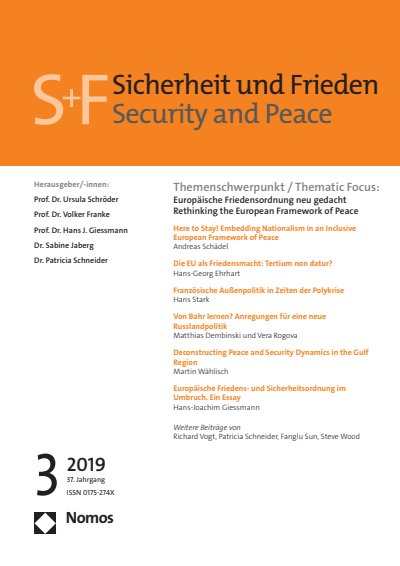French Foreign Policy in the Age of Polycrisis

Under the presidency of Emmanuel Macron, France has set itself the goal of strengthening its international presence, being more proactive and defining the European reform agenda. However, the French room for manoeuver is limited.
The increasingly confrontational nature of the clashes between the United States, China and Russia as well as the US's challenge to the rules of multilateralism reduce the influence of a regional power such as France. Furthermore, French domestic issues - for example high unemployment and the lack of competiteveness as well as social tensions - contradict its claim to equality on the international stage. Last but not least, France's capacity to respond to global challenges such as climate change or domographic change in Africa is very limited.
This article appeared in the magazine published regularly by Nomos editions under the direction of Prof. Dr. Ursula Schröder "S+F Sicherheit und Frieden. Security and Peace, 37. Jg. 3/2019", pages 118 to 123.

Available in:
Regions and themes
ISBN / ISSN
Share
Related centers and programs
Discover our other research centers and programsFind out more
Discover all our analysesMerz’ European Policy-making: The End of the ‘German Vote’?
Friedrich Merz’s European ambition is to turn Germany, long seen as hesitant into a leading actor within the European Union (EU). To that end, he has pledged to end the “German vote,” a phenomenon that epitomizes the paradox of a country both indispensable and frequently absent from European decision-making.

Securing critical raw material (CRM) value chains – a prerequisite for Europe’s technological resilience
At the heart of economic security, technological resilience is a backbone of the European Union’s (EU) competitiveness. The EU’s energy and digital transitions depend on critical raw materials (CRM).

Reconciling competitiveness and demographic change: a Franco-German imperative
France and Germany are facing parallel demographic shifts that could reshape the future of their economies and their social models. These shifts reflect broader European patterns but are magnified by the central role both nations play in EU governance and competitiveness.
Taking the Pulse: Does France's Political Crisis Weaken Europe's Geopolitical Hand?
While the EU tries to navigate a myriad international challenges, France is experiencing historic political disarray. What impact will instability in Paris have on Europe's geostrategic capacity?











